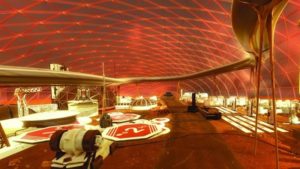
The Mohammed Bin Rashid Space Centre (MBRSC) in Dubai, United Arab Emirates, has revealed further details behind the grand vision to colonise Mars by 2117 set out by their Highnesses Sheikh Mohammed bin Rashid Al Maktoum and Sheikh Mohamed Bin Zayed Al Nahyan in February 2017.
Speaking to an audience at the Humans To Mars Summit held in Washington, DC, on May 9, 2017, Saeed Al Gergawi, Programme Director of the Mars 2117 Programme at the MBRSC, said, “In the UAE…we believe that we are on the cusp of a new age of exploration. There’s a new space race that affects literally every human on Earth.”
“In the UAE, we live in a rough neighborhood,” Al Gergawi added. “Our neighborhood has over 100 million youth, with over 35 percent unemployment.”
This high rate of youth unemployment in the region has a well-known negative impact such as radicalisation and even terrorism, Al Gergawi explained. One of the rationales for the Mars 2117 programme, however, is to turn the circumstances of young people in the Middle East into a positive impact that engages them in meaningful goals involving education in science and technology.
“This is the impact we’re betting on,” said Al Gergawi.
“We want to enable the youth to play an active role in advancing the global efforts toward enhancing the Red Planet and other planetary bodies,”
The Mars 2117 initiative was announced at the MBRSC facilities in Dubai by their Highnesses Sheikh Mohammed bin Rashid Al Maktoum, the Vice President and Prime Minister of the UAE and Ruler of Dubai, and Sheikh Mohamed Bin Zayed Al Nahyan, the Crown Prince of the UAE and Ruler of Abu Dhabi, on February 16, 2017.
“The new project is a seed that we plant today, and we expect future generations to reap the benefits, driven by its passion to learn to unveil a new knowledge,” Sheikh Mohammed bin Rashid Al Maktoum said at the time. “The landing of people on other planets has been a longtime dream for humans. Our aim is that the UAE will spearhead international efforts to make this dream a reality.”
“The Mars 2117 Project is a long term project, where our first objective is to develop our educational system so our sons will be able to lead scientific research across the various sectors. The UAE became part of a global scientific drive to explore the space, and we hope to serve humanity through this project,” Abu Dhabi Crown Prince His Highness Sheikh Mohamed bin Zayed Al Nahyan added.
The first phase of the project will focus on preparing the human cadres able to achieve scientific breakthrough to facilitate the arrival of human to the Red Planet in the next decades. The Mars 2117 Project also aims to prepare an Emiratis scientists team and to develop an international scientific consortium to speed up the research project. The project will start with an Emiratis scientific team and will be extended to include international scientists and researchers, in addition to streamline the human efforts in term of exploring and settlement of the Red Planet.
The project will also focus on developing faster means of transportation from and to the Red Planet, and come up with an integrated scientific visualization of how the settlement will look like, and how life will be there in term of food, transportation and energy among many others.
Earlier, an Emirati team of engineers, along with a group of scientists and researchers, have set a concept for the first human city on mars that will be built by robots. The plan showcased during the summit highlighted the expected lifestyle on Mars in terms of transport, power production and providing food, as well as infrastructure works and materials used for the construction of the city.
MBRSC’s Al Gergawi told the Humans To Mars Summit that the Mars 2117 Programme rests on four pillars: research and development, where the UAE contributes to global efforts to colonise Mars; collaboration, where this colonization is achieved through international partnerships with other governments, universities, and research institutes; education programmes that embed a culture of discovery and exploration among young people in the Middle East; and, through education, enable young people from the region to engage and participate in global scientific efforts.
Original published at: https://spacewatch.global/2017/05/uaes-mbrsc-reveals-details-mars-2117-colonisation-programme/
 SpaceWatch.Global An independent perspective on space
SpaceWatch.Global An independent perspective on space

